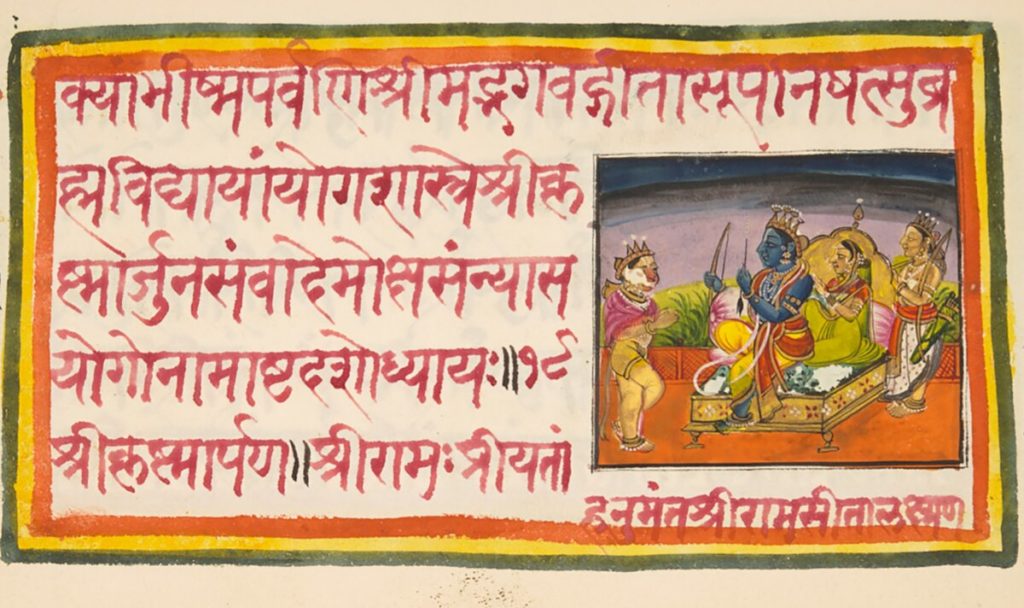Hi, this is Alexandra Hindson from Enlightened Learning, and I’m here
today to continue my talks and storytelling of the Bhagavad Gita and the Mahabharata.
I think the Mahabharata— in my personal opinion— is one of the most extensive stories (I don’t know, I think it’s about 18 volumes long) that deals with the complexities of life. It covers everything possible in human life. The stories are allegories with lessons to be taken and learned and applied in our own lives.
I want to share with you one story, another one, there are many— I could speak for years on this— and because my heart and my love for this text is so extensive and deep and passionate, I want to just continue the series and share it with you and then give you some strategies to accompany them.
So this story is about a young family, two families who have merged, the Pandavas and the Kauravas. And the young Pandavas have lived with their father and mother out in the woods, raised in nature, out of the palace of comfort, and seduction, and wealth. Whereas the Kauravas– remember, these are cousins— the Kauravas have lived in the palace with all of the comforts of feathered pillows, and comfortable beds, and riches, and everything that they could desire, on top of, like, the most incredible food, and the wealth that surrounds them.
So the Pandavas are, in our story, the righteous ones. The Kauravas who live in the palace— and not to say that people who live in palaces are unrighteous— but they are the Dharma, they are those who break with truth and righteousness.
Because of their greed. But, alas, I got a bit ahead of myself. So the Pandavas, young men in their teens, so they’re actually not men, they’re still boys, five of them, and each one is born from a god. We are all born of the gods, we all have special powers, and so each one of them has special powers. One of them is named Arjuna and his special power is his ability to shoot an arrow straight and hit a target. It’s his archery, it’s his skill of focus and concentration.
Arjuna, his destiny is determined right from the beginning of his birth that he will be the greatest warrior and he will fight the battle, the battle to bring the end; the end of the world of the line of kings. So he is trained, and yet his training does not really begin until his father
dies.
Pandu has been faced with a curse, and unfortunately, the curse catches up with him and takes his life. As a result of the death of his father, Kunti, the mother of the Pandavas, decides it’s time to return to the kingdom in which all five boys are the beneficiaries of. The Kingdom is called Hastinapur, and Hastinapur is one of the most grandiose kingdoms in the world. And she decides it’s time for her young boys to step into their manhood and return to their families.
And so they return to Hastinapur. And of course, the Kauravas who see these ungangly, uncultured, uncouth young men, raised in the woods with tree bark as clothes and hair matted, laugh at them. But the Pandavas have been raised in righteousness so they have a refinement and quality that is hard to explain. But as they are received back into the kingdom, with their grandfather, and a great teacher — so their grandfather is named Bhishma— They are welcomed and loved in their return except by the Kauarvas.
And Bhishma recognizes that the boys are now ready for their training. Arjuna is the star, and a great warrior arrives at the Kingdom who will be their teacher. Drona will educate, teach Arjuna the skillful art of archery. And so he focuses attention on Arjuna because he recognizes a great gift. Arjuna does, in fact, become a great archer.
But let’s refer to one of the lessons Drona gives the five Pandavas and the Kauarvas. One day he places a bird, or the makings of a bird— a sculpture of a bird— way up in the trees in a forest. He asks all of his students, the Kauarvas and the Pandavas, to come out to a clearing, and he teaches them the real art of archery.
And so he calls the Pandava brothers, a couple of them, Yudhishthira, Nakula, and then Duryodhana. So the three of them come and Drona asks (so they know that the target is a bird in the trees) and he asks each one of them, “What do you see?”
Each one of them have a story: “Well I see the clouds, I see the sky, I see the trees! I see the bird, I see a branch, I see…” And they continue.
And Drona just says to them, “No; you will not hit that target, you cannot release your arrow. Go back into the lineup.”
And he continues this with the Kauarvas and the Pandavas, until finally, each one of them has not seen what Drona is looking for them to see, until he calls Arjuna. Arjuna comes, prepares himself to strike the bird, and Drona asks him, “What do you see Arjuna?”
And Arjuna says, “I see the bird.” That’s all he sees.
And Drona says, “Yes; what else do you see?”
“I see the left eye of the bird.”
And Drona says, “Release your arrow.”
That is focus. That’s all Arjuna was able to see. Of course, he saw other things, but his mind was so focused on the target, the eye of the bird, that his success at hitting his target was unequivocal. He hit the target.
So I leave this with you as a practice— and it’s a yogic practice of sitting for a few minutes with a target in front of you— what I use is a black dot. And place the black dot onto a door or a wall sitting in front of it, and simply focus your mind on the dot. And your eyes on the dot. And see if you can keep your eyes open without blinking. It’s tricky, but try your best and start timing yourself. This will train the mind to focus. This will train the eyes to focus just as our Arjuna did on that eye of the bird. It’s one little step.
We’ll continue this as we move through the Bhagavad Gita and the Mahabharata and the other strategies for building focus and concentration. That is one simple tool. A dot on a piece of paper: tape it onto the wall or a door, sit in front of it, and focus your mind. Try it for two minutes, try it for three minutes, and then just continue building it over time, and your mind will become like the greatest warrior that Arjuna was, where he never missed his Target.
That’s enough for today on the Mahabharata and some of the teachings from this incredible text. So delighted to be with you here, and have a wonderful day. Namaste.

